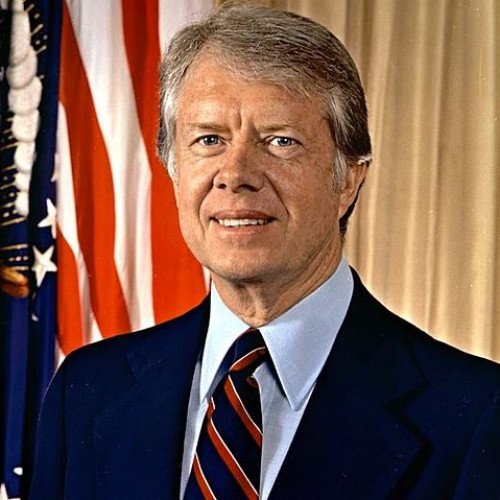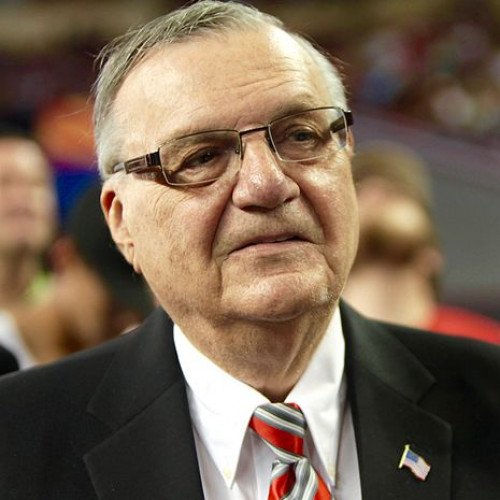Jimmy Carter VS Joe Arpaio

Jimmy Carter
James Earl Carter Jr. (born October 1, 1924) is an American politician and philanthropist who served as the 39th president of the United States from 1977 to 1981. A member of the Democratic Party, he previously served as a Georgia State Senator from 1963 to 1967 and as the 76th governor of Georgia from 1971 to 1975. Since leaving the presidency, Carter has remained engaged in political and social projects as a private citizen. In 2002, he was awarded the Nobel Peace Prize for his work in co-founding the Carter Center. Raised in Plains, Georgia, Carter graduated from the United States Naval Academy in 1946 with a Bachelor of Science degree and joined the United States Navy, where he served on submarines. After the death of his father in 1953, Carter left his naval career and returned home to Georgia to take up the reins of his family's peanut-growing business. Carter inherited comparatively little due to his father's forgiveness of debts and the division of the estate among the children. Nevertheless, his ambition to expand and grow the Carters' peanut business was fulfilled. During this period, Carter was motivated to oppose the political climate of racial segregation and support the growing civil rights movement. He became an activist within the Democratic Party. From 1963 to 1967, Carter served in the Georgia State Senate, and in 1970, he was elected as Governor of Georgia, defeating former Governor Carl Sanders in the Democratic primary on an anti-segregation platform advocating affirmative action for ethnic minorities. Carter remained as governor until 1975. Despite being a dark-horse candidate who was little known outside of Georgia at the start of the campaign, Carter won the 1976 Democratic presidential nomination. In the general election, Carter ran as an outsider and narrowly defeated incumbent Republican President Gerald Ford. On his second day in office, Carter pardoned all the Vietnam War draft evaders by issuing Proclamation 4483. During Carter's term as president, two new cabinet-level departments, the Department of Energy and the Department of Education, were established. He established a national energy policy that included conservation, price control, and new technology. In foreign affairs, Carter pursued the Camp David Accords, the Panama Canal Treaties, the second round of Strategic Arms Limitation Talks (SALT II), and the return of the Panama Canal Zone to Panama. On the economic front, he confronted stagflation, a persistent combination of high inflation, high unemployment and slow growth. The end of his presidential tenure was marked by the 1979–1981 Iran hostage crisis, the 1979 energy crisis, the Three Mile Island nuclear accident, and the Soviet invasion of Afghanistan. In response to the invasion, Carter escalated the Cold War when he ended détente, imposed a grain embargo against the Soviets, enunciated the Carter Doctrine, and led a 1980 Summer Olympics boycott in Moscow. In 1980, Carter faced a challenge from Senator Ted Kennedy in the primaries, but he won re-nomination at the 1980 Democratic National Convention. Carter lost the general election to Republican nominee Ronald Reagan in an electoral landslide. He is the only president in American history to serve a full term of office and never appoint a justice to the Supreme Court. Polls of historians and political scientists usually rank Carter as a below-average president. Carter's activities since leaving the presidency have been viewed more favorably than his presidency itself. In 1982, Carter established the Carter Center to promote and expand human rights. He has traveled extensively to conduct peace negotiations, monitor elections, and advance disease prevention and eradication in developing nations. Carter is considered a key figure in the Habitat for Humanity charity. He has written over 30 books, ranging from political memoirs to poetry, while continuing to actively comment on ongoing American and global affairs such as the Israeli-Palestinian conflict.
Statistics for this Xoptio

Joe Arpaio
Joseph Michael Arpaio (; born June 14, 1932) is an American former law enforcement officer and politician. He served as the 36th Sheriff of Maricopa County, Arizona for 24 years, from 1993 to 2017, losing reelection to Democrat Paul Penzone in 2016. Starting in 2005, Arpaio took an outspoken stance against illegal immigration, styling himself as "America's Toughest Sheriff". In 2010, he became a flashpoint for opposition to Arizona's SB1070 anti-illegal immigrant law, which was largely struck down by the Supreme Court of the United States. Arpaio is also known for investigating former U.S. President Barack Obama's birth certificate, and, as of 2018, he continued to claim without evidence that it was forged.Arpaio has been accused of numerous types of police misconduct, including abuse of power, misuse of funds, failure to investigate sex crimes, criminal negligence, abuse of suspects in custody, improper clearance of cases, unlawful enforcement of immigration laws, and election law violations. A Federal court monitor was appointed to oversee his office's operations because of complaints of racial profiling. The U.S. Department of Justice concluded that Arpaio oversaw the worst pattern of racial profiling in U.S. history, and subsequently filed suit against him for unlawful discriminatory police conduct. Arpaio and the MCSO were named as defendants in dozens of civil lawsuits brought by citizens arrested by Arpaio and his deputies alleging wrongful arrest, wrongful death, entrapment and other claims, costing taxpayers in Maricopa County over $140 million in litigation against Arpaio during his tenure as sheriff.Over the course of his career, Arpaio was the subject of several federal civil rights lawsuits. In one case, he was a defendant in a decade-long suit in which a federal court issued an injunction barring him from conducting further "immigration round-ups". A federal court subsequently found that after the order was issued, Arpaio's office continued to detain "persons for further investigation without reasonable suspicion that a crime has been or is being committed." In July 2017, he was convicted of criminal contempt of court, a crime for which he was pardoned by President Donald Trump on August 25, 2017. In a separate racial-profiling case which concluded in 2013, Arpaio and his subordinates were found to have unfairly targeted Hispanics in conducting traffic stops.Although Arpaio sought another term as Maricopa County Sheriff in 2016, the contempt of court conviction eroded much of his remaining political support, and he was defeated in the election by Paul Penzone, a Democrat who reversed many of Arpaio's policies after taking office. Arpaio was an unsuccessful candidate in Arizona's Republican primary election for U.S. Senate in 2018. On August 25, 2019, Arpaio issued a statement saying that he would run for sheriff of Maricopa County in 2020. He lost the August 2020 primary election.